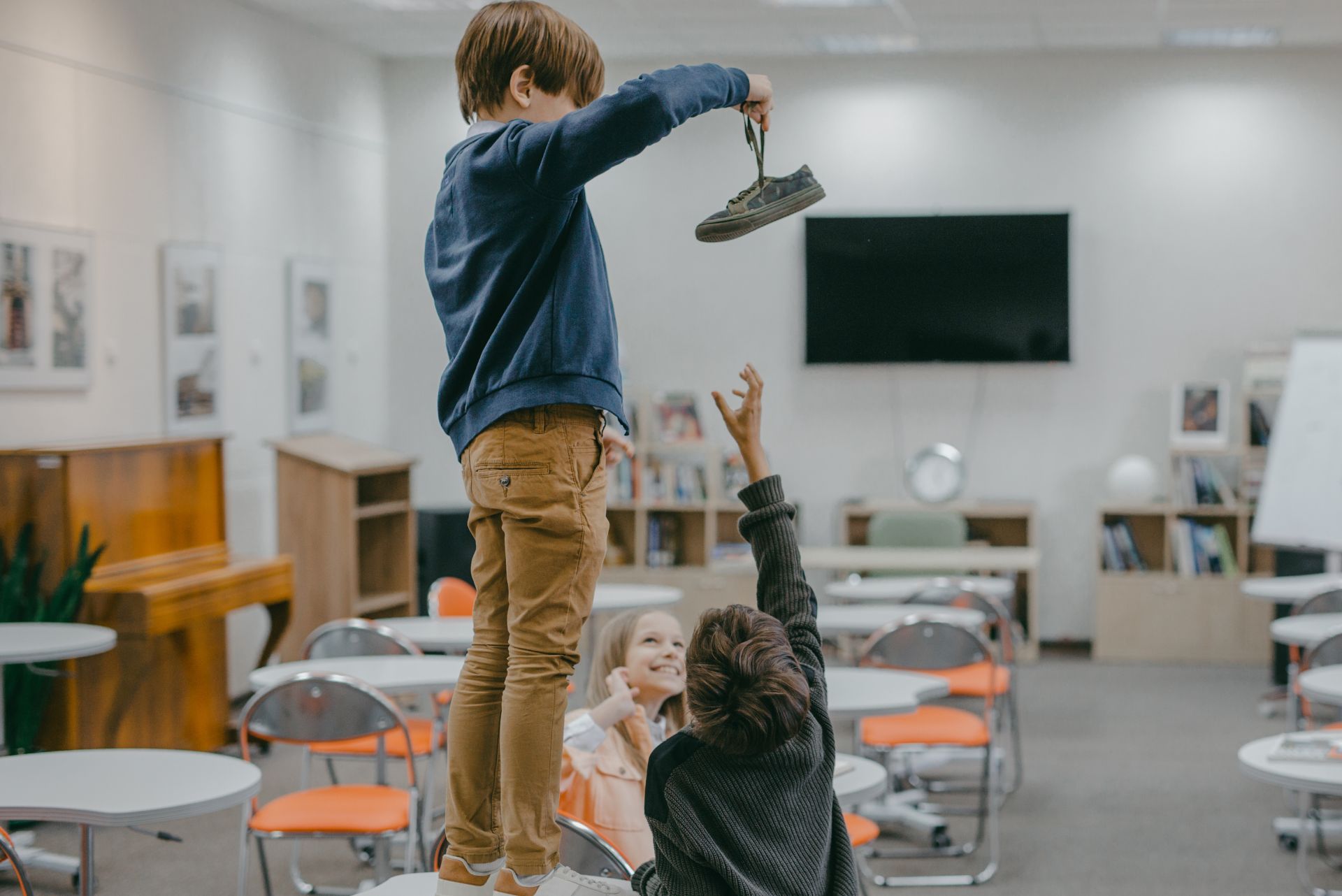Help Kids Deal With Social Bullying in 6 Christ-like Steps
How did you experience bullying as a kid? Maybe it was on the playground, during lunch in the cafeteria, or on a bus. Bullying hurts, no matter where it takes place; but unfortunately, the places and types of bullying kids today can experience has only increased. In fact, most social bullying instances have moved from in-person, physical attacks to happen almost entirely online—and often, to happen more frequently as kids are emboldened by anonymity and safety behind a screen.
Here are six ways you can help teach the children in your life how to deal with the most common form of bullying kids face in their day-to-day lives: cyberbullying, or social bullying.
1. Be Safe to Talk To
The first and most important step to help kids deal with social bullying is to make sure they know you’re a safe person to talk to about it. After all, if you don’t know it’s happening, it can be hard to help them through it. Admittedly, getting kids to talk to you about social bullying can be difficult. They may be too embarrassed to talk about it. Maybe they feel like it’s something they should be able to handle themselves, or maybe they’re scared that getting adults involved will make their situation worse, get them in trouble, or restrict their online activities. Do your best to make sure kids know that you’re safe to talk to—no matter what the situation is—and that you’ll always seek what’s best for everyone involved.
A good way to do this is to practice keeping your own responses and emotions in check when learning about potentially tricky things in kids’ lives. Have you demonstrated you can be trusted with their secrets or with moments that they might feel embarrassed about? Do you make an effort to understand their side of things when they share of issues with their friends? Are you quick to anger when mistakes are made, or do you patiently and compassionately seek a solution together? Proving yourself to be trustworthy in these other areas can help kids feel safe enough with you to share if social bullying happens.
2. Avoid Feeding Into Social Bullying
Once you’ve learned that social bullying has happened, the next step is to help kids learn how to do damage control in the moment. Teach kids that, often, the best first response to cyberbullying is to NOT respond. Whatever it is—mean texts, social media posts, or message boards—if the subject has gotten offensive or hurtful, the best thing to do is to log off and walk away for a bit. Kids may not be excited to hear that—they may want to stay online and fight back—but they need to understand that responding in the heat of the moment, when you’re hurt and angry, doesn’t make it better.
As social bullies lash out at others to try and get attention or to make themselves appear superior, the best way to deal with cyberbullying is to simply block, delete, and ignore hurtful comments. Teach kids that by not responding to a bully’s goading, they’re giving space for God to work, for the bully to reflect, and for them to “win” by protecting their peace and choosing the right path. Encourage them to talk to God about what’s happening as they turn off their device and to tell Him how they feel about it. This course of action gives space for God to handle the social bullying Himself and to step in to protect the child’s heart. He may even lead someone else to stick up for them or for the bully to become ashamed.
3. Practice Emphatic Listening
The third way you can help kids experiencing social bullying is to listen to them. This may seem obvious, but we’re talking about listening without looking to solve the problem right away. Sometimes kids just need people to listen to them talk about how upset they are, without trying to lecture them about a solution. Of course we do want to help kids solve the problem, and we’ll get to that, but the first and simplest thing you can do for them, after they’ve walked away from the social bullies, is to practice empathetic listening.
They might be heated or hurt by the things that were said or done to them, or maybe they’re worried about the repercussions this could have on their reputation or with their friends. Sit and listen to them, allowing them to share all their feelings and thoughts, while doing your best to empathize. Only after empathy can you say, “would you like to talk about what we can do about it?”
4. Pray for the Bully
Fourth—and this might be the hardest one—pray for the bully. Jesus told us in Matthew 5 to “love your enemies and pray for those who persecute you.” Share this verse with kids who are dealing with social bullying and ask them what they think it means to love their enemies. Clarify that loving your enemies doesn’t mean you support their actions, it simply means choosing to see them the way God does. God cares for our bullies just as much as He cares for us, and what’s more, He wants them to learn to do better. Practice praying with kids that social bullies would come to know Jesus as their Savior, have their own hurts healed, and stop hurting others. Pray, also, for the strength to handle the situation in a way that honors God.
5. Report Social Bullying
Next, strategize the best way to report social bullying. Kids may think that loving others means not telling on them so they don’t get in trouble, but that’s not necessarily true. Sometimes, the best way you can show love is by not allowing someone’s bad and harmful behavior to continue—especially when it comes to social bullies, as they’ll only continue to hurt others unless they’re stopped.
Teach kids that if they ever experience or witness social bullying, they should:
- Take screenshots of ugly messages or posts before they’re deleted;
- Ensure all factual data is clearly visible, like profile names, times, and dates;
- Report the post, profile, or person to the social media platform or to a trusted adult (this can be done anonymously if there’s fear of retaliation); and
Block and delete the bully’s comment, message, or account.
6. Remind Kids of God’s Truth
Last but not least, help kids remember what really matters by comparing the truth of God to the lies of the bully. Often, when social bullying happens online rather than face-to-face, bullies can be emboldened to say cruder, harsher things. No matter how false the insults may be, they’re still hurtful and can affect a child’s image of themselves. A good way to combat this is to go into God’s Word and remind kids what the Almighty God thinks of them.
Pay special attention to verses like Jeremiah 31:3 that talk about God’s love for the child, verses like Psalm 139:14 to remind them they are “fearfully and wonderfully made,” or Psalm 147:3 that says God heals the brokenhearted. In fact, many of the Psalms are all about praising God in the midst of feeling attacked or hated by others, remembering just how much He loves us, how great He is, and how little the opinions of others matter. Whenever kids are attacked by lies through social bullying, they can remember and rely on God’s forever truth to set the record straight.
The words we use can encourage or hurt. Help kids learn how to stick up for themselves and for others in a way God would be proud of when experiencing social bullying, while reviewing their own online messaging to make sure they’re not using hurtful words. Just like Jesus, kids can choose to be kind even when others are mean. It’s up to you to give them the tools to know what to do!
This content is from the CEF podcast Teach Kids. Listen to more content like this on the Teach Kids podcast through your favorite podcast platform. #TeachKids #KidsMin
How Christian Youth in Action® Is Changing Lives: Impactful Youth Ministry Activities
Discover how CYIA®️ missionaries are transforming communities through impactful youth ministry activities and 5-Day Clubs®️. See how Christian Youth In Action®️ training prepares teens for effective ministry.
Helping Children Find Comfort in God: 5 Practical Strategies | CEF
Kids often express big emotions—fear, worry, sadness—and it can be hard to know how to respond. This piece offers five practical ways to comfort children while gently guiding them toward the ultimate source of lasting comfort: a relationship with God. Whether you’re a parent, teacher, or caregiver, these ideas are meant to help you support kids emotionally and spiritually when they need it most.
Teaching Children to Serve God: Making Service a Priority | CEF
How many activities do you have planned for your family? I don’t know about you, but sometimes I feel way too rushed trying to get from one activity to the next. I barely have time to think. But do we realize that the way we manage and schedule our time and our kid’s time teaches children what’s worth making time for? We want to show kids that it’s a priority to take time to serve God.
Stay Connected with CEF
Subscribe to our email lists to receive updates, news, and stories based on your needs and interests.




